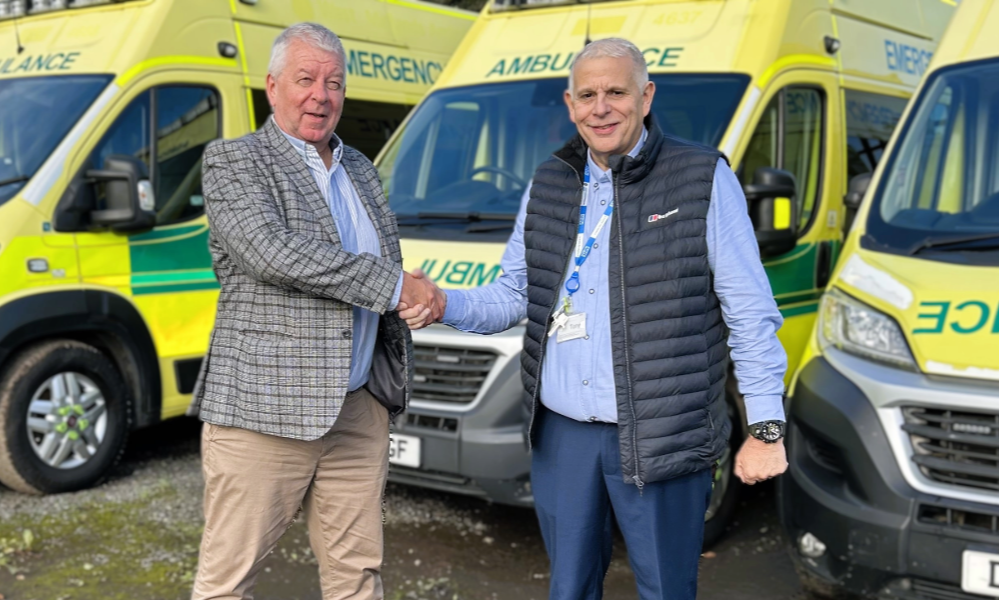Siemens Financial Services’ Jonathan Andrew speaks to
Jason T Hesse about
financing renewables, health care, the promise of emerging markets
and the value of keeping customers happy.
Responsible for most of Siemens
Financial Services’ (SFS) €7 billion of assets in Europe and Asia,
Jonathan Andrew says he is looking forward to the year ahead.
SFS, a runner-up for the Leasing Life ‘German
Lessor of the Year’ award, is one of Europe’s most profitable
leasing companies, and it expects to report more growth this
year.
After spending 10 years at GE Capital and
another two years at computer manufacturer Gateway, Andrew joined
SFS as head of the UK business in 2003.
Today, Andrew is chief executive of SFS’ COFEA
unit – commercial finance Europe and Asia Pacific, which includes
the lessor’s vendor, structured and asset finance portfolios, as
well as all asset-based lending activities.
How well do you really know your competitors?
Access the most comprehensive Company Profiles on the market, powered by GlobalData. Save hours of research. Gain competitive edge.

Thank you!
Your download email will arrive shortly
Not ready to buy yet? Download a free sample
We are confident about the unique quality of our Company Profiles. However, we want you to make the most beneficial decision for your business, so we offer a free sample that you can download by submitting the below form
By GlobalDataThe company’s wide range of products and
geographies, covering any deal from a small, flow-ticket
transaction up to an €100 million structured finance deal across
two large continents, means that Andrew has acquired a nearly
unsurpassed international know-how.
Developing markets
This experience has recently
developed strongly in the direction of emerging markets, where
Andrew says SFS is seeing “exponential growth”.
“Markets like China and India are continuing
to develop well, with very strong, double-digit growth numbers
expected to continue throughout 2010,” he says.
He believes that because Siemens already has a
“very strong” health care business in China, with over 40,000
employees, SFS has developed “a certain advantage on the financing
side”.
“We’ve been operating in China for over four
years now, so we’ve built up a lot of knowledge as well. You really
learn with the market as it develops,” he says, adding that SFS has
now “really established” the nature of its products in the market
place.
Because of its close relationship with
Siemens, SFS covers the manufacturer’s three main segments:
industry, health care and energy – leveraging business from each
one.
Siemens’ recent push in the energy field, for
example, has given SFS the opportunity to gain important market
share in the renewables energy market place, particularly in
financing wind and solar technology.
“The way that these projects are put together
needs to reflect the financing, and this is an area where we can
bring a lot of competencies and strength,” Andrew says.
He anticipates that renewable energy financing
will be a significant area of growth for SFS this year, both in the
emerging markets and in the more developed western economies.
 Indeed, last
Indeed, last
month, SFS – alongside sustainable energy firm Mainstream Renewable
Power – won a major contract from the Crown Estate to develop one
of the nine €111 billion wind farm zones off the UK’s coast.
“Increasingly, we believe we’ll become far
more associated with competency in renewables, just as we are in
health care,” Andrew says.
“The more you are successful in projects, the
more synonymous you become with having an appetite and having the
capital available for these deals.”
But how does SFS – which traditionally was
more involved in small and medium-ticket deals – manage these
larger transactions?
“There’s no question about it – the whole
lifecycle of the agreement is very different when dealing with
large transactions,” Andrew explains.
He says that SFS has assembled a team of
specialist staff who get involved in the more complex
transactions.
“You need specific industry knowledge sitting
within the financing skill set; you need a team that can look at
the whole equation,” he says.
“Thankfully, being a part of a global
conglomerate, we have the unique ability – as opposed to our
bank-based competitors – to have real insight into what is going on
in the market place. We can just pick up the phone and ask our
colleagues about customers, or product development, or residual
values.”
Focusing on the customer
Ultimately, however, the key to
success this year will be to offer high-quality customer service,
Andrew believes.
“At the end of the day, it’s about intimacy
and knowledge of the market place,” he explains. “A lot of the
themes haven’t changed from previous years – you have to adopt a
high level of customer service and differentiate between
customers.”
This approach, Andrew continues, has given SFS
the edge over many of its competitors.
“All of the businesses in the industry have
been hit by the macroeconomic cycle, and we’re certainly no
exception. But when you see some of the really poor results that a
lot of our competitors have produced, we would say that we’re
pretty confident with how we’ve performed,” he says.
In recent years, SFS has been a cash-cow for
Siemens. Despite a dip in return on equity in the fourth quarter
last year, when ROE fell to 11.3 percent, overall SFS was well
above its target range of 20-23 percent in 2009, at 25.9 percent.
Pre-tax profit was also strong last year, bringing in €304
million.
Andrew adds: “For many years now, we’ve been
in the upper quartile of our financial returns, and we really
anticipate that this will continue to be the case.”







